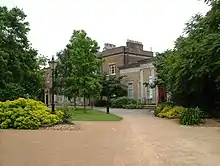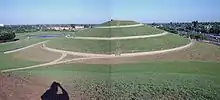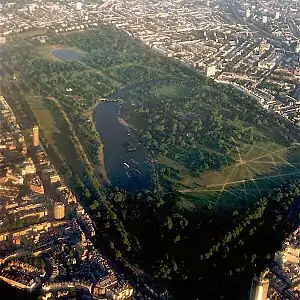Parks and open spaces in the London Borough of Ealing
The London Borough of Ealing, one of the outer London boroughs although not on the periphery, has over 100 parks and open spaces within its boundaries. These include allotments, cemeteries, playgrounds, and golf courses in addition to the larger open spaces such as nature conservation areas. The main areas are:
- Acton Green: small open space with children's play area adjacent to Chiswick Common on the Hounslow side of the municipal boundary
- Acton Park: a Victorian park
- Berkeley Fields, Greenford: large area including three golf courses
- Blondin Park, includes a small nature area. This was officially opened by Gavin Redman who is the great-great grandson of Blondin [a]
- Large areas along the River Brent collectively forming the Brent River Park with numerous areas containing sports grounds, playing fields and golf courses.[b]
- Brent Meadow
- Hanwell Meadows
- Long Wood
- Perivale Park
- Pitshanger Park: Long meandering park following the river Brent. Tennis courts and bowling greens, selection of football pitches and open grass. Adjacent Golf course and Rugby club. Park remains open at nights, but car park is locked.
- Warren Farm - 61 acres of Metropolitan Open Land. In 2014, the council planned to lease the land to Queen's Park Rangers, for 200 years, to use as a training centre. This caused local protests over the financial terms and a judicial review was held to challenge the deal.[1]
- Dean Gardens: Small park in West Ealing used as allotments until 1909. Contains a children's play area.
- Drayton Green: Green open space with children's play area in West Ealing.
- Ealing Common: large area of flat, open grassland ringed by mature roadside trees. Used for grazing animals in the last century, it is still possible to see the occasional rider. Stages circuses and fairs.
- Ealing Green: a small area of grass and trees close to Ealing's historical centre, occasionally used for small fairs and other events.
- Fox Wood Nature Reserve: part of Hanger Hill Park near Hanger Lane tube station
- Gunnersbury Park: while located on the Hounslow side of the Ealing/Hounslow boundary, Gunnersbury Park is jointly owned by Ealing and Hounslow and administered by a joint committee of the two councils
- Hanger Hill Park: includes a fragment of oak woodland (Fox Wood) to the west, now a Fox Wood Nature Reserve.
- Hanger Hill Wood: there are many interesting native trees to enjoy on this walk, and there may be woodpeckers or red foxes to spot.
- Haven Green: Small open green with smattering of mature trees and flowerbeds opposite Ealing Broadway station in the town centre. Popular for lunchtime breaks in the summer.
- Lammas Park, South Ealing: 25 acres (10ha). The name derives from 'Lammas lands', which were used for grazing cattle in mediaeval times. Bowling green, croquet pitch, tennis courts, children's playground and playcentre. The park nearly adjoins Walpole park mentioned below.
- Northala Fields: a development of derelict land adjoining Rectory Fields in Northolt.

- Walpole Park: Ealing's "premier park". Hosts a jazz and comedy festival in the summer, and also contains the Pitzhanger Manor museum. Contains a walled rose garden, semi-formal rest garden with wildlife pond, larger pond with fountain, open grass areas for games. The whole is enclosed either by railings and planted screening or surrounding houses. The park is closed at nights.

The Brent River Park is one of 11 parks throughout Greater London chosen to receive money for redevelopment by a public vote in 2009. The park received £400,000 towards better footpaths, more lighting, refurbished public toilets and new play areas for children.[2]
Allotments
Across the London Borough of Ealing there are 63 allotments sites. Most are council-owned but a few are independent.[3] The allotments in this part of London dramatically increased during World War II as part of the government effort to feed the nation. To encourage the uptake of allotment plots by people who had no access to a garden themselves, a campaign was waged under the slogan “Dig for Victory”. Towards the later end of the 20th century they became popular again amongst the growing ethnic communities, as a source of some of their more familiar and traditional vegetables which were otherwise unobtainable in British shops. Some local organisations have now formally recognised some of the benefits that come from working on allotments and actively encourage their use.[4] Ealing Council has also signed up to the Unitary Development Plan which it is hoped will safeguard the existing allotments from building developers.[5]
Notes
a. ^ This park is named after the French aerialist Charles Blondin (who was first to cross the Niagara Falls on a tightrope). He once lived in a house on Northfield Avenue, Little Ealing and the park covers what was formerly the western part of its large grounds.[6]
b. ^ The Brent River Park is not only a public amenity but forms an important part of the borough’s Green Corridors with which to aid nature conservation. Also, by prohibiting development on what is much of the river Brent’s natural flood plain, it provides some measure of flood control.[7]
References
- "The Battle For Warren Farm Moves To High Court", Ealing Today, 30 January 2014
- London parks get £6m for revamp (BBC News) accessed 10 March 2009
- Ealing Council Allotment sites in the London Borough of Ealing Accessed 2010-02-17
- Food Vision Allotments Archived 2009-05-30 at the Wayback Machine Accessed 2010-02-17
- Food Vision Food Matters Strategy: Sec. 8. Future Developments; Subsec. For food security; para. 5 Archived 2008-08-27 at the Wayback Machine Accessed 2010-02-17
- A History of the County of Middlesex: Volume 7: Acton, Chiswick, Ealing and Brentford, West Twyford, Willesden (1982), Ealing and Brentford: Manors, pp. 123-128. Accessed 2010-02-17
- Ealing Council (12 Oct 2004) Unitary development plan, chapter 3, Green space and the natural environment Archived 2010-02-01 at the Wayback Machine. Accessed 2010-02-17
External links
- Ealing parks and open spaces Accessed 2010-02-17
- Northala Fields Accessed 2010-02-17
- Ealing Council (12 October 2000) Byelaws with respect to pleasure grounds, public walks and open spaces. Accessed 2010-02-18

